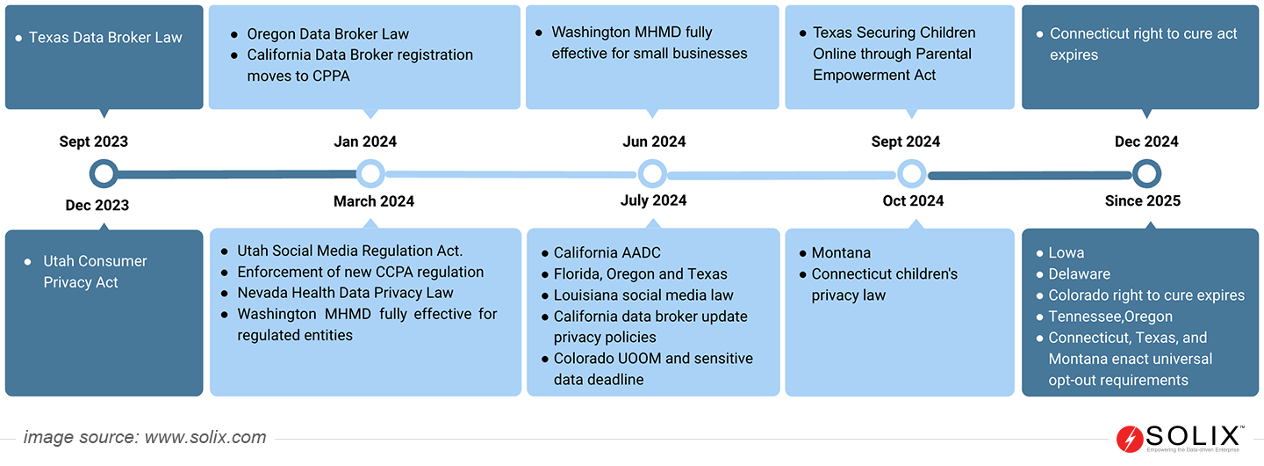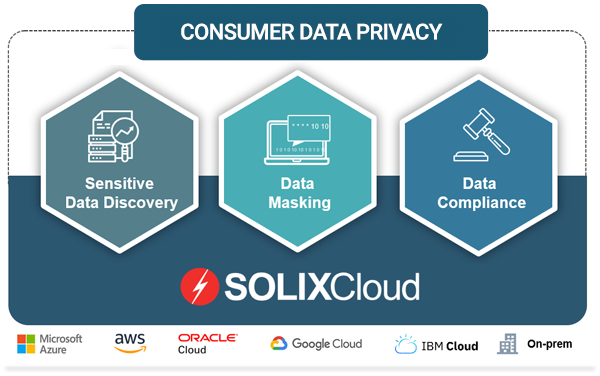
How to Comply with Consumer Data Privacy Regulations?
This blog is a comprehensive resource on the core elements of consumer data privacy, various privacy regulations, the challenges involved, and the trends that lie ahead. As a cherry on the cake, equip yourself with the best data privacy compliance practices and an introductory glimpse on “Privacy by Design,” a proactive approach to data security.
Importance of Consumer Data Privacy Regulations
According to Gartner, by 2024, 75% of the world’s population will have its data covered under modern privacy regulations. This surge in regulatory coverage highlights the increasing importance of robust data privacy practices. Below are a few aspects of why consumer data privacy is a big fish to be considered.
- Monetary Repercussions: Non-compliance with data privacy regulations can result in hefty fines and legal sanctions. For example, under the GDPR, organizations can be fined up to €20 million or 4% of their annual global turnover, whichever is higher.

- Consumer Rights: Consumer privacy rights empower individuals to control access to their personal information. Laws and regulations like the GDPR and CCPA consider these rights fundamental, protecting consumers’ personally identifiable information worldwide.
- Company Brand Repercussions: Large-scale data breaches significantly impact customer loyalty. A leading cybersecurity firm found that a single privacy breach could cause 34% of customers to stop doing business with a company, as loyal users expect critical privacy obligations to be met.
Best Practices for Data Privacy Compliance
- Understand Applicable Laws: In today’s interconnected digital world, every jurisdiction has distinct regulations overseeing the handling of personal data. A crucial aspect of achieving data privacy compliance is grasping and adhering to these varied, decentralized privacy laws.
- Conduct a Data Inventory: Identify what personal data you collect and how it’s collected, processed, stored, and shared. Sources may include websites, apps, CRM systems, and third-party partners. It helps you to understand data flow and ensure accountability.
- Develop a Privacy Policy: It is crucial to develop a clear and comprehensive privacy policy. It should outline the types of data collected, their usage, sharing practices, retention periods, risk management, and users’ rights.
- Obtain Consent: It is essential to obtain explicit consent from users before collecting their data via consent forms, opt-in checkboxes, etc. Consent must be informed and freely given; users can withdraw it at any time.
- Implement Data Security Measures: Implement robust data security measures to protect the data you collect. This includes using encryption, conducting regular security audits, implementing access controls, and ensuring data is stored securely.
- Enable Data Subject Rights: Allow individuals to exercise their data subject rights, such as access, rectify, erase, and transfer their data. These rights must be easily accessible and understandable to ensure transparency with your users.
Maintaining detailed records of your data processing activities, managing third-party risks, having an incident response plan (IRP), regularly reviewing and updating your privacy policies, and appointing a Data Protection Officer (DPO) can further help your organization establish a robust framework for complying with consumer data privacy regulations.
Future Challenges and Trends
Data privacy regulations are constantly changing, struggling to keep pace with technological advancements and the ever-evolving ways our personal information is collected and used.
- Global Harmonization: As data flows across borders more freely, there’s a growing need for international harmonization of data privacy regulations. Bridging the gaps between different jurisdictions will ensure consistent personal data protection worldwide.
- Consumer Rights: Future regulations may include consumer rights, such as the right to access, rectify, and erase personal data and the right to data portability as a mandate rather than a recommendation.
- Privacy by Design: The concept of privacy by design, which emphasizes integrating privacy considerations into the design of systems and processes from the outset, is gaining traction. Future regulations may enforce privacy by design principles to minimize privacy risks proactively.
- Emerging Technologies: Advancements in technologies such as artificial intelligence, blockchain, and the Internet of Things present new challenges for data privacy. Regulators will need to adopt laws to address the unique privacy concerns raised by these technologies.
EU AI Act: first regulation on artificial intelligence | Topics | European Parliament
With a growing emphasis on data privacy worldwide, 2024 surpasses 2023 as it witnesses the proliferation of new privacy regulations and amendments to existing ones. Here are some new industry and data privacy updates that could reshape the enterprise data security landscape by 2024.
A Primer on Privacy By Design
Data privacy by design is an architected approach to cloud data management that ensures all data privacy regulations globally are met instead of requiring different solutions for different geographies and jurisdictions.
SOLIXCloud Consumer Data Privacy is a suite of three powerful tools that complement the W3C open standard security features of the SOLIXCloud Common Data Platform.
Failing to manage consumer data privacy carries significant risks to brand reputation, customer relationships, and potential fines. Whether you’re a seasoned data professional or just starting your journey, understanding the complexities of global privacy laws, its future trends, and industry best practices for compliance, like “Privacy by Design,” could help you turn the table. Achieve compliance with confidence.
Vishnu Jayan is a tech blogger and Senior Product Marketing Executive at Solix Technologies, specializing in enterprise data governance, management, security, and compliance. He earned his MBA from ICFAI Business School Hyderabad. He creates blogs, articles, ebooks, and other marketing collateral that spotlight the latest trends in data management and privacy compliance. Vishnu has a proven track record of driving leads and traffic to Solix. He is passionate about helping businesses thrive by developing positioning and messaging strategies for GTMs, conducting market research, and fostering customer engagement. His work supports Solix’s mission to provide innovative software solutions for secure and efficient data management.






